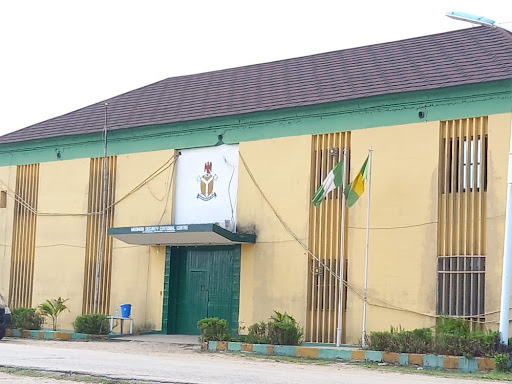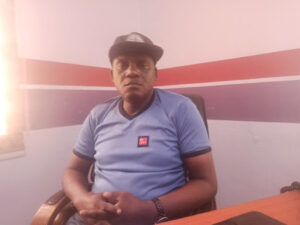Initiative Gives Nigerian Ex-inmates Boost To Restart Their Lives
Seeing the neglect prisoners and ex-inmates suffer from the society and their families, a non-governmental organisation is out to change the narrative.

Hezekiah Olujobi, born on Aug. 8, 1963, suffered unlawful detention at Agodi prison in Ibadan, Oyo State, Southwest Nigeria between Jan. 1987 and March 1993, on allegations of armed robbery which he insists he knew nothing about.
While in the correctional centre, he met many inmates who were either awaiting trial or serving jail term on various allegations and crimes. After his release from prison, Olujobi proceeded to Bible school and, upon graduation, became Pastor of a Christ Apostolic Church. There, he started evangelism in various prisons in Southwest Nigeria.
His continuous efforts to “gain souls for Jesus Christ” led to the birth of the Centre for Justice Mercy and Reconciliation (CJMR), an organisation supporting prisoners and ex-inmates in 1999. The group has intervened in “over 300 cases of victims of wrongful convictions and has helped to facilitate the release” of a number of them.
“I realised that many people are in prison facing the same challenge I had years back. Some are rotting in jail simply because they were in the wrong place at the wrong time,” he told HumAngle.
“The aim at first was to simply visit prisons and encourage people but the purpose of the ministry unfolded itself when I started interacting and making moves for the release of innocent inmates.”
The process
Speaking on how he was able to differentiate criminals from innocent inmates and the roles he played to secure their release, Olujobi explained that prisoners share their challenges and what brings them to a correctional centre among themselves. He said that they often tell the truth when they see those making moves to get them out of incarceration.

“After listening to stories of inmates, myself and my team would do independent investigations, trace the affected individuals’ files and track people who have understanding of the case from the beginning.
“Once we realise the cases are good to defend, we make efforts to determine the factors responsible for their incarceration. We would get lawyers willing to work with us on pro-bono, especially for those detained without case files in the ministry of justice. For inmates who said they were wrongfully convicted, we often re-investigate their stories and connect them with lawyers to file their appeal.”
In cases where some matters already get to the Supreme Court, CJMR would write a letter to state governors and ministries of justice for their intervention and in some cases, “victims of wrongful detention and those who have obediently served in prisons for lots of years get governors’ pardon,” he explained.
In 2009, Olujobi registered CJMR with the Corporate Affairs Commission (CAC) and expanded to having volunteers visiting Ilesha in Osun, Agodi in Oyo, Ibara in Ogun, and the Maximum Correctional Centre in Lagos.
Through the organisation’s ‘Half-Way Home’, CJMR has been able to accommodate hundreds of ex-inmates who had nowhere to go or were rejected by their families after their release from a correctional facility.
Poor justice system
Nigeria is a large country with countless cases of human rights abuses. From the illegal arrests of innocent citizens to internal displacement of millions of people, there is no significant framework to cater for prisoners and ex-inmates after spending their most productive years in custody.
HumAngle has done a series on the poor management of inmates and the disturbing situation around awaiting trial inmates. The situation has led to an overcrowding crisis and jail breaks in Nigeria’s facilities.

HumAngle has also done reports on the challenges of victims of wrongful convictions and the difficulties faced by ex-inmates struggling with stigmatisation as well as neglect by authorities and their relatives.
Testimonies
One of those supported by CJMR is Omobolanle Moruf, a septuagenarian who was held across five prisons in different states for 22 years. He said he was wrongly accused of robbery in Ibadan in 1997.
Asked how the incident occured, Moruf responded in tears, “I was arrested on the street by overzealous police officers who accused me of robbery. I was forced to make a confessional statement and it led to my journey to prison and it lasted for over 20 years.”
According to section 403 of the Criminal Code Laws of the Federation of Nigeria 1990, Moruf should have upon conviction been sentenced to imprisonment for not less than 14 years and not more than 20 years.
The law provides that if an offender used a firearm (armed robbery) to assault others, he should upon conviction be sentenced to imprisonment for life or death in a case of murder. This was, however, not the case with Moruf. It is unclear why he had to spend over two decades in a correctional facility as against the provisions of the law.
Attempts by this reporter to seek clarification on this proved abortive as Moruf could not hold back his tears. With most of his teeth removed as a result of torture, he said he finally regained his freedom in early 2019.
“If not for CJMR who escalated my case to late Governor Abiola Ajimobi, I wouldn’t have been freed. I was sentenced to life imprisonment even when the police didn’t find any arm with me.”
He told HumAngle that he was rejected by his family members upon his return from a correctional centre but CJMR put him in the organisation’s ‘half-way home’, a three bedroom apartment where CJMR keeps ex-inmates facing accommodation challenges. They identify their challenges and then help them out.
More interesting stories
Multiple ex-inmates said the organisation usually helps them to pay their house rent when leaving its ‘half-way home’ and also provides them with little capital to start their lives afresh. The funds are mostly from donations made by Olujobi’s church members.
Another ex-inmate who preferred not to be named because of stigmatisation said he met Olujobi when they were in a correctional facility together and CJMR never stopped supporting him until he was released 20 years after. After neglect by the government and rejection by family members, the 72-year -old man now lives in Lagos with a new wife.
One of the successful cases handled by CJMR was the case of Olusola Adepetu, a herbal traditional practitioner in Oyo State in the 1990s. He had befriended a woman, Ranti Moradeyo and, on the night of Nov. 20, 1990, they both went out on a date. They later left for their respective houses.
Unfortunately, the woman’s corpse was found in the Sanyo area on the Lagos-Ibadan highway. Based on public adverse opinion, Adepetu was arrested and subsequently charged to the Oyo State High Court. He was later convicted to life imprisonment, according to Section 319(1) of the Criminal Code Cap 30 Laws of Oyo State, 1978.
His appeal failed even at the Supreme Court in 1998 and he had to spend over two decades in Kirikiri. Interestingly, upon independent review of the court judgement that convicted Adepetu, from the High Court to the Supreme Court, CJMR in 2015 stumbled on the dissenting judgment of one judge who tore down all lower court judgements, discharged and acquitted Adepetu as far back as 1998.
The organisation used the dissenting judgment to appeal for Adepetu’s total freedom and he was set free by the Oyo State Government after 26 years in prison in Oct. 2016. Adepetu has since returned to his herbal traditional business.
For Olujobi, CJMR’s focus is to transform Nigeria’s criminal justice system by proffering solutions to the challenges of prison congestion and address the plight of inmates.
Support Our Journalism
There are millions of ordinary people affected by conflict in Africa whose stories are missing in the mainstream media. HumAngle is determined to tell those challenging and under-reported stories, hoping that the people impacted by these conflicts will find the safety and security they deserve.
To ensure that we continue to provide public service coverage, we have a small favour to ask you. We want you to be part of our journalistic endeavour by contributing a token to us.
Your donation will further promote a robust, free, and independent media.
Donate HereStay Closer To The Stories That Matter




